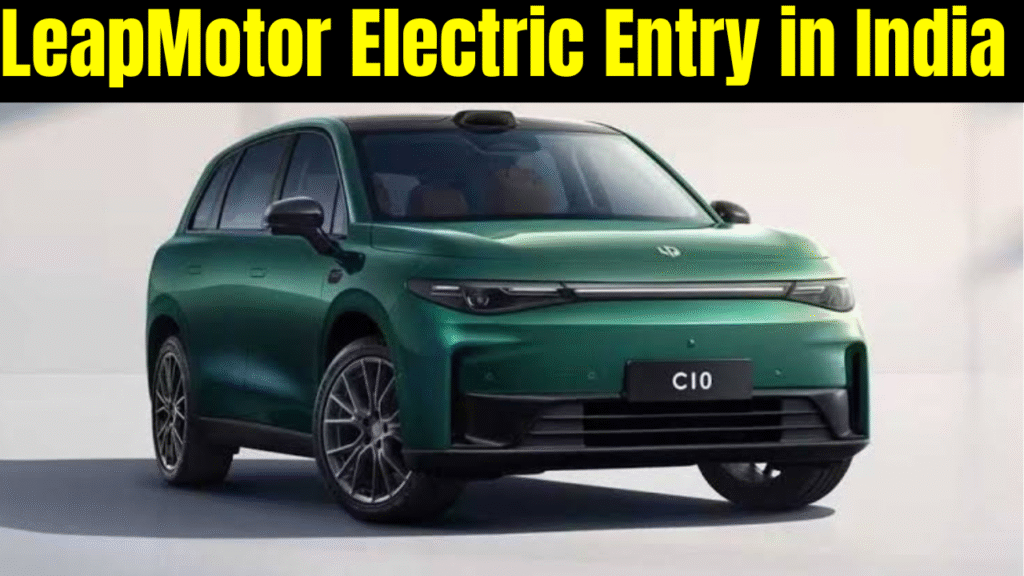Stellantis is preparing to bring Leapmotor electric vehicles into the Indian market, with a clear target of launching by the end of 2025. The move follows Stellantis’s strategic investment of around 1.6 billion US dollars in October 2023 to acquire roughly 21 percent of the Chinese EV maker. Out of this partnership, a new entity called Leapmotor International was created, with Stellantis holding a controlling 51 percent stake. This joint venture is responsible for manufacturing, exports, and sales of Leapmotor cars outside Greater China, and India has been marked as one of the most important destinations in this expansion plan.
Although the company has not officially confirmed which model will make its debut in India, strong indications suggest that the Leapmotor T03, a compact city-friendly hatchback, and the C10, a mid-size SUV, are among the frontrunners. The B10 compact SUV has also been mentioned as a possibility in industry reports. These models have been chosen carefully to appeal to a segment of Indian buyers who are looking for electric cars that feel modern and well-equipped but are not positioned in the ultra-premium category. Stellantis already offers Citroën electric models in India, but Leapmotor is expected to fill a slightly different space by going after buyers who value advanced technology, features, and a sense of sophistication in an affordable EV package.
Also Read:New Kia Seltos Hybrid Spotted in Europe — Global Debut Expected Soon
One of the biggest decisions still under consideration is whether the first batch of Leapmotor EVs will come to India as fully built imports or if Stellantis will start local assembly. High import tariffs—often ranging between 70 to 100 percent—make imported EVs very expensive, so the economics of the launch depend heavily on this choice. Stellantis has existing manufacturing plants in India, including in Tamil Nadu and Pune, which could be leveraged for assembly if it makes financial sense. Localisation would help position Leapmotor EVs more competitively against rivals like BYD, MG, and Tata, who are already active in the electric car space.
Affordability and pricing remain the biggest question marks. While Leapmotor is not expected to compete directly with Tata’s mass-market EVs, it also won’t go head-to-head with ultra-luxury EVs. Instead, the company seems to be targeting that growing slice of Indian buyers who want a premium experience without spending the kind of money that imported EVs currently demand. This is why the eventual pricing strategy will likely aim for the mid-premium space, sitting in competition with models like the MG ZS EV or BYD Atto 3.
For Stellantis and Leapmotor, India offers both opportunity and challenge. On the one hand, the country is one of the fastest-growing automotive markets in the world, with EV adoption rising due to high fuel prices and strong government pushes for cleaner mobility. On the other hand, profit margins are tight, infrastructure is still developing, and customer expectations around range, safety, and service are getting tougher by the day. Leapmotor’s leadership has already acknowledged that operating in India will feel similar to competing in the electronics sector, where scale matters and margins are narrow.
Also Read: Tata Punch Facelift Spotted, launching soon.
Another crucial element is after-sales and charging support. At present, Stellantis has not detailed how Leapmotor cars will be backed in terms of service centers or charging infrastructure, but it is highly likely that the company will lean on Stellantis’s existing network in India. Without strong support, even the most competitive EVs risk struggling to gain trust among Indian customers.
If everything goes as planned, Leapmotor’s arrival could add a new dimension to India’s EV landscape. Stellantis views the country not only as a market but as a strategic growth hub for Leapmotor’s global ambitions. For Indian buyers, this could mean more choice in the EV space, with cars that combine Chinese EV technology with Stellantis’s experience in global manufacturing and distribution. The real test will be whether the pricing, positioning, and support structure can balance out the challenges of tariffs and infrastructure, making Leapmotor a serious contender against both established Indian players and aggressive international brands.
Also Read: Hero MotoCorp Passes on GST 2.0 Savings — Up to ₹15,743 Off!

